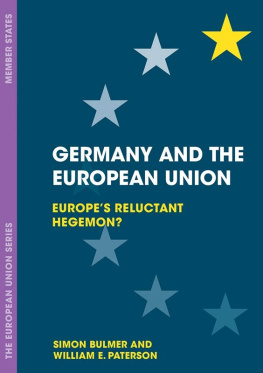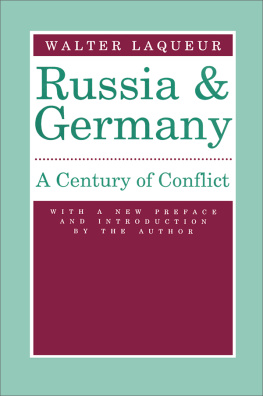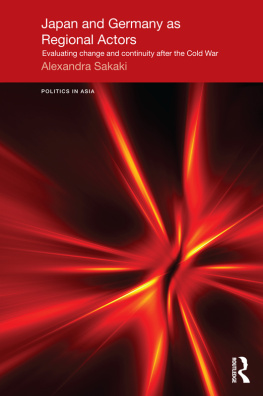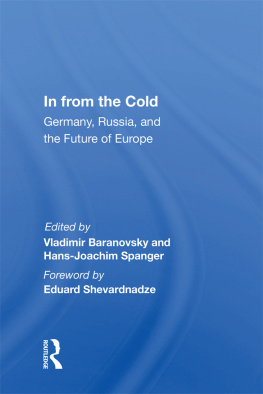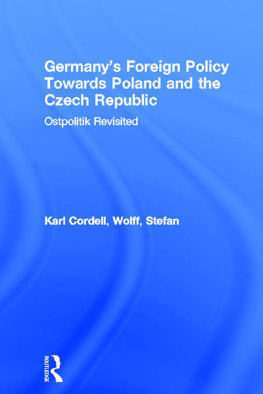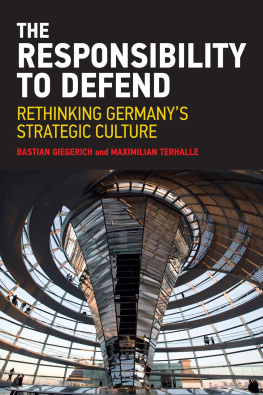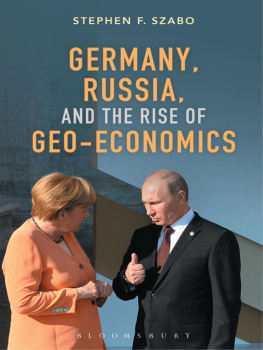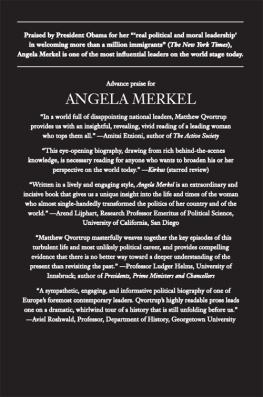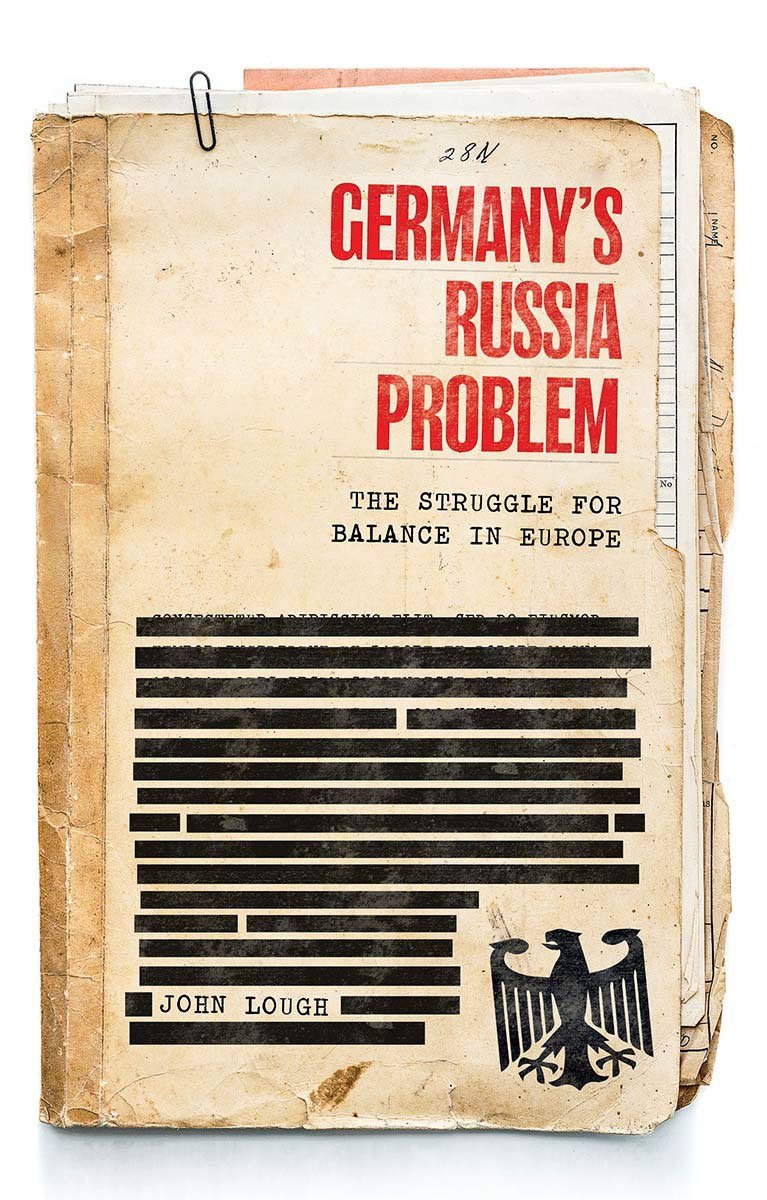Germanys Russia problem
Russian Strategy and Power
Series editors: Andrew Monaghan and Richard Connolly
Editorial board
Julian Cooper, OBE
Emily Ferris
Tracey German
Michael Kofman
Katri Pynnniemi
Andrei Sushentsov
Germanys Russia problem
The struggle for balance in Europe
John Lough
Manchester University Press
Copyright John Lough 2021
The right of John Lough to be identified as the author of this work has been asserted by them in accordance with the Copyright, Designs and Patents Act 1988.
Published by Manchester University Press
Altrincham Street, Manchester M1 7JA
www.manchesteruniversitypress.co.uk
British Library Cataloguing-in-Publication Data
A catalogue record for this book is available from the British Library
ISBN 978 1 5261 5150 6 hardback
First published 2021
The publisher has no responsibility for the persistence or accuracy of URLs for any external or third-party internet websites referred to in this book, and does not guarantee that any content on such websites is, or will remain, accurate or appropriate.
Cover image: Getty Images/THEPALMER
Typeset by
Servis Filmsetting Ltd, Stockport, Cheshire
Contents
The origins of this book go back more than thirty-five years to my days as an undergraduate at Cambridge University where I had the good fortune to benefit from Irina Kirillovas brilliant teaching of nineteenth-century Russian literature. From her I first learned about the deep cultural relationship between Germany and Russia. Similarly, Jo Whaleys mesmerising lectures and supervisions on the revolutions of 1848 opened my eyes not just to a key moment in European history but also to the notion of Germanys Sonderweg (special path). As a young policy analyst, I profited hugely from the knowledge and guidance of Chris Donnelly, Head of the Soviet Studies Research Centre at Sandhurst who in 1988 identified the need to recruit a German speaker, believing that something might happen in the German Democratic Republic. Less than a year into the job, I was covering the collapse of the Berlin Wall and the process that led to Germanys reunification. It was a thrilling experience and formative at the same time.
During my time as NATOs first representative in Moscow (19951998), I had the extraordinary privilege of being based at the German Embassy after it became NATOs Contact Point in 1996. Ernst-Jrg von Studnitz, Germanys outstanding ambassador, and his staff provided wise counsel and taught me much about the way Germany approaches Russia. In this respect, I am indebted also to Colonel Manfred Diehl who worked alongside me to improve the Russian publics understanding of NATO. His commitment to building trust-based relations with Russia combined with his affection for the country set a fine example. It was painful to see him expelled from Moscow in 1999 and branded a German fascist by a senior Russian Defence Ministry official at the start of NATOs air campaign against Yugoslavia. My German colleagues at NATO Headquarters who worked on Russia and Ukraine, especially Ulrich Brandenburg, Jrgen Schulz and Christof Weil, also contributed greatly to my understanding of Germanys approach to its East. I am particularly grateful also to BP Germanys government affairs team who were excellent colleagues throughout my time at TNK-BP (20032008) and gave me valuable insight into Germanys energy relationship with Russia and the place of the Russian market in the thinking of German business.
Over recent years and during my research for this book, I have benefited greatly from conversations with many German officials who have taken the time to debate Russia and policy towards it. Unfailingly courteous, they have always offered an informed viewpoint and been willing to listen to another perspective. I am also especially grateful to Hannes Adomeit, Marieluise Beck, David Crawford, Judy Dempsey, Liana Fix, Hans-Joachim Falenski, Ralf Fcks, Michael Harms, Martin Hoffmann, Wilfried Jilge, John Kornblum, Stefan Meister, Ren Nyberg, Alexander Rahr, Irina Scherbakowa, Jan Techau and Reinhard Veser, who have regularly shared their views and broadened my knowledge. John and Ren, two outstanding ambassadors of their countries to Germany and in Rens case to Russia as well, also took the trouble to comment on the manuscript. My sincere thanks to them as well as to Duncan Allan and Janet Gunn who also offered invaluable guidance on ways to improve the overall text. Wolfgang Brett, Roger Golland and Philip Vorobyov kindly reviewed individual chapters and provided helpful feedback. James Sherr, friend and colleague for over three decades, deserves special thanks for so frequently acting as a sounding board and allowing me to tap into his unparalleled understanding of Russias conduct of foreign policy. I am also indebted to Tatiana Parkhalina, Lilia Shevtsova and Konstantin von Eggert, all of whom who I first met over twenty-five years ago. Their breadth of knowledge and subtle insights have contributed greatly to my understanding of Russia and its relations with the West. Sadly, Charles Dick, who mentored me in my early days at Sandhurst and read the full manuscript, did not live to see it published. His extraordinary knowledge of history helped me greatly during the drafting process and his shrewd comments on the text were immensely valuable.
I carried out the initial research for this book at NATO Defense College in Rome in the autumn of 2017 thanks to a visiting fellowship generously offered by its Research Division. I am grateful to all those at the College who made my stay so pleasant and productive.
I must also thank my editors at Manchester University Press, Tom Dark and Alun Richards, for making the production process so smooth and straightforward, and especially the series editor, Andrew Monaghan, for his cheerful encouragement and advice. My copy- editor Doreen Kruger made a daunting task appear easy.
My heartfelt thanks go to Suzy and Heidi for their understanding and company during the writing process that coincided with the first months of lockdown and other restrictions related to the COVID-19 pandemic in 2020. Over more than thirty years, Suzy has borne my interest in Germany and Russia with patience, fortitude and an abundance of good humour. Her eagle eye and grammatical rigour improved the draft manuscript enormously.
The book is dedicated to the memory of my late father William Lough (19142000), a brilliant linguist, who taught me German and helped me take my first steps in Russian. His knowledge of the literature of both countries and his descriptions of visiting Germany in the 1930s and the USSR in the late 1950s sparked my curiosity at a young age and inspired a passion.
Redbourn
July 2021
Germanys relationship with Russia is the most important link between the western world and the largest country on the European continent. As the western-led global governance order established after 1945 continues to erode as part of a natural process of evolution, Germanys interests are increasingly in conflict with Russias goals to re-balance the international system and renegotiate Europes security arrangements agreed at the end of the Cold War. As Europes reluctant indispensable power, Germany finds itself increasingly responsible for shaping western policy towards Russia as America reduces its role in European affairs in a world in which the West has lost considerable moral authority over the past two decades. For a country that only regained full sovereignty in 1990 after forty-five years of post-war division, this is a hugely challenging task, one made much harder by its deep and troubled history with Russia.


